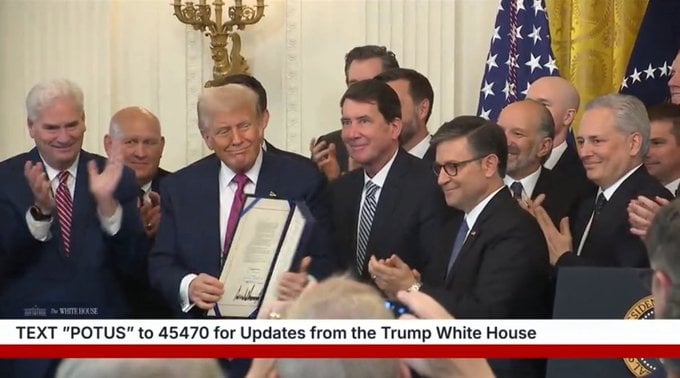
Trump signs GENIUS Act into law, establishing federal framework for stablecoins
The enactment of stablecoin legislation could help promote investment, innovation, and financial security, Trump previously said.
President Donald Trump signed the GENIUS Act into law Friday afternoon, creating the first comprehensive federal regulatory framework for payment stablecoins in the US.
“We worked hard. It’s a very important act, the GENIUS Act. They named it after me,” Trump joked at the opening of the White House signing ceremony in the East Room. “And I want to thank — I want to thank you. This is a hell of an act.”
“This afternoon, we take a giant step to cement American dominance in global finance and crypto technology, as we sign the landmark GENIUS Act into law,” he said.
The signing ceremony saw the participation of members of Congress and crypto industry leaders, including Tether CEO Paolo Ardoino, Coinbase CEO Brian Armstrong, Circle CEO Jeremy Allaire, and Gemini’s Cameron and Tyler Winklevoss, to name a few.
The GENIUS Act, short for Guiding and Establishing National Innovation for US Stablecoins Act, cleared Congress on Thursday afternoon after securing approval from the US House. The bill passed the Senate last month.
Co-sponsored by Senate Banking Committee Chairman Tim Scott and spearheaded in the Senate by Sen. Bill Hagerty, the law establishes a dual federal-state supervision system for stablecoin issuers, who will be regulated by either federal banking regulators or state authorities based on their size and structure.
Stablecoins deliver obvious utility by offering inexpensive, 24/7 payments. But, by enabling seamless and efficient access to U.S. dollars across the developing world, stablecoins will also serve as a store of value when local monetary policy goes awry.
Only designated permitted payment stablecoin issuers (PPSIs) will be allowed to issue stablecoins in the US after a grace period.
Under the new framework, issuers must maintain full reserves backing stablecoins, conduct regular audits, and maintain high transparency standards. The law also grants coin holders priority repayment rights in case of issuer insolvency and requires compliance with anti-money laundering and anti-terrorism sanctions rules.
The Act’s prohibitions on unapproved stablecoin issuance will take effect approximately 18 months after enactment, with implementation expected around November 2026. This timeline allows regulatory agencies to issue implementing regulations and provides industry transition time.
Trump has consistently expressed support for the GENIUS Act. He said in March that stablecoins could strengthen the US dollar’s global dominance and that passing stablecoin legislation would encourage investment, innovation, and financial stability.
“The GENIUS Act will go down in history as a law that served as a foundational step in the mainstreaming of crypto as an asset class. By catalyzing innovation on our greatest export, the greenback, GENIUS will position the dollar as the global reserve currency for decades to come, enhance national security and unlock financial opportunity across the globe,” said Chris Perkins, Managing Partner and President of CoinFund, in a statement.
Trump also played a key role in advancing the bill, alongside the Clarity Act and the Anti-CBDC Act, by helping all three clear key procedural hurdles before they moved forward in the House.
“I’m also committed to signing landmark crypto market structure legislation this year to grow the industry,” Trump said.
